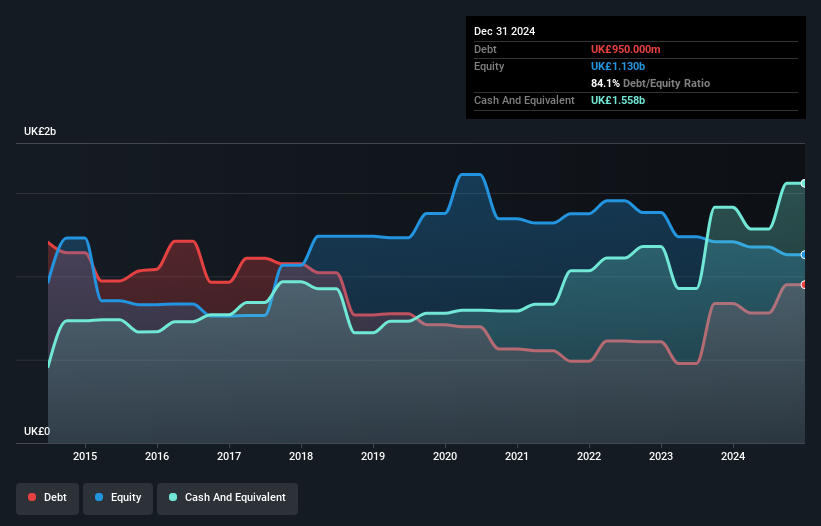
Some say volatility, rather than debt, is the best way to think about risk as an investor, but Warren Buffett famously said that 'Volatility is far from synonymous with risk.' When we think about how risky a company is, we always like to look at its use of debt, since debt overload can lead to ruin. We can see that Balfour Beatty plc (LON:BBY) does use debt in its business. But should shareholders be worried about its use of debt?
We've discovered 1 warning sign about Balfour Beatty. View them for free.When Is Debt A Problem?
Generally speaking, debt only becomes a real problem when a company can't easily pay it off, either by raising capital or with its own cash flow. Part and parcel of capitalism is the process of 'creative destruction' where failed businesses are mercilessly liquidated by their bankers. However, a more common (but still painful) scenario is that it has to raise new equity capital at a low price, thus permanently diluting shareholders. Having said that, the most common situation is where a company manages its debt reasonably well - and to its own advantage. The first step when considering a company's debt levels is to consider its cash and debt together.
What Is Balfour Beatty's Net Debt?
The image below, which you can click on for greater detail, shows that at December 2024 Balfour Beatty had debt of UK£950.0m, up from UK£837.0m in one year. However, it does have UK£1.56b in cash offsetting this, leading to net cash of UK£608.0m.

How Strong Is Balfour Beatty's Balance Sheet?
We can see from the most recent balance sheet that Balfour Beatty had liabilities of UK£2.98b falling due within a year, and liabilities of UK£1.52b due beyond that. Offsetting this, it had UK£1.56b in cash and UK£1.25b in receivables that were due within 12 months. So it has liabilities totalling UK£1.69b more than its cash and near-term receivables, combined.
This deficit is considerable relative to its market capitalization of UK£2.51b, so it does suggest shareholders should keep an eye on Balfour Beatty's use of debt. Should its lenders demand that it shore up the balance sheet, shareholders would likely face severe dilution. While it does have liabilities worth noting, Balfour Beatty also has more cash than debt, so we're pretty confident it can manage its debt safely.
View our latest analysis for Balfour Beatty
On the other hand, Balfour Beatty saw its EBIT drop by 2.7% in the last twelve months. If earnings continue to decline at that rate the company may have increasing difficulty managing its debt load. The balance sheet is clearly the area to focus on when you are analysing debt. But ultimately the future profitability of the business will decide if Balfour Beatty can strengthen its balance sheet over time. So if you want to see what the professionals think, you might find this free report on analyst profit forecasts to be interesting.
But our final consideration is also important, because a company cannot pay debt with paper profits; it needs cold hard cash. While Balfour Beatty has net cash on its balance sheet, it's still worth taking a look at its ability to convert earnings before interest and tax (EBIT) to free cash flow, to help us understand how quickly it is building (or eroding) that cash balance. Happily for any shareholders, Balfour Beatty actually produced more free cash flow than EBIT over the last three years. That sort of strong cash conversion gets us as excited as the crowd when the beat drops at a Daft Punk concert.
Summing Up
While Balfour Beatty does have more liabilities than liquid assets, it also has net cash of UK£608.0m. And it impressed us with free cash flow of UK£181m, being 111% of its EBIT. So we are not troubled with Balfour Beatty's debt use. The balance sheet is clearly the area to focus on when you are analysing debt. However, not all investment risk resides within the balance sheet - far from it. Case in point: We've spotted 1 warning sign for Balfour Beatty you should be aware of.
Of course, if you're the type of investor who prefers buying stocks without the burden of debt, then don't hesitate to discover our exclusive list of net cash growth stocks, today.
Valuation is complex, but we're here to simplify it.
Discover if Balfour Beatty might be undervalued or overvalued with our detailed analysis, featuring fair value estimates, potential risks, dividends, insider trades, and its financial condition.
Access Free AnalysisHave feedback on this article? Concerned about the content? Get in touch with us directly. Alternatively, email editorial-team (at) simplywallst.com.
This article by Simply Wall St is general in nature. We provide commentary based on historical data and analyst forecasts only using an unbiased methodology and our articles are not intended to be financial advice. It does not constitute a recommendation to buy or sell any stock, and does not take account of your objectives, or your financial situation. We aim to bring you long-term focused analysis driven by fundamental data. Note that our analysis may not factor in the latest price-sensitive company announcements or qualitative material. Simply Wall St has no position in any stocks mentioned.
About LSE:BBY
Balfour Beatty
Balfour Beatty plc finances, develops, builds, maintains, and operates infrastructure in the United Kingdom, the United States, and internationally.
Excellent balance sheet second-rate dividend payer.
Similar Companies
Market Insights
Community Narratives




